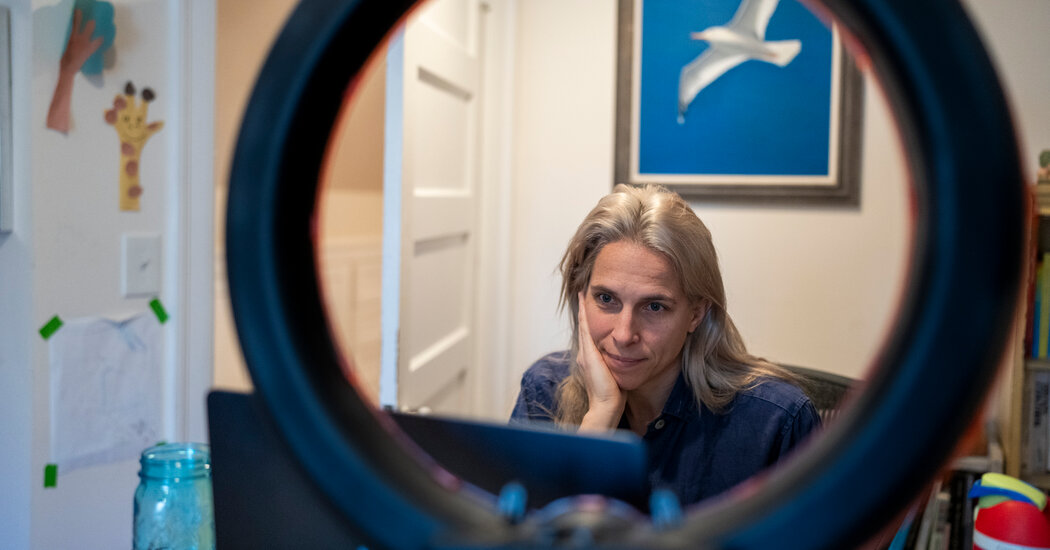Here is the result in plain text:
On a recent Friday morning, Daniel, a lawyer in his early 40s, was in a Zoom counseling session describing tapering off lithium. Earlier that week he had awakened with racing thoughts, so anxious that he could not read, and he counted the hours before sunrise.
At those moments, Daniel doubted his decision to wean off the cocktail of psychiatric medications which had been part of his life since his senior year in high school, when he was diagnosed with bipolar disorder.
Was this his body adjusting to the lower dosage? Was it a reaction to the taco seasoning he had eaten the night before? Or was it what his psychiatrist would have called it: a relapse?
“I still does go to the place of — what if the doctors are right?” said Daniel.
Ms. Delano nodded sympathetically on his screen.
Ms. Delano is not a doctor; her main qualification, she likes to say, is having been “a professional psychiatric patient between the ages of 13 and 27.” During those years, when she attended Harvard and was a nationally ranked squash player, she was prescribed 19 psychiatric medications, often in combinations of three or four at a time.
Then Ms. Delano decided to walk away from psychiatric care altogether, a journey she detailed in a new memoir, “Unshrunk: A Story of Psychiatric Treatment Resistance.”
Increasingly, many psychiatrists agree that the health care system needs to do a better job helping patients get off psychotropic medications when they are ineffective or no longer necessary. The portion of American adults taking them approached 25% during the pandemic, according to government data, more than triple what it was in the early 1990s.
But they also warn that quitting medications without clinical supervision can be dangerous. Severe withdrawal symptoms can occur, and so can a relapse, and it takes expertise to tease them apart. Psychosis and depression may flare up, and the risk of suicide rises. And for people with the most disabling mental illnesses, like schizophrenia, medication remains the only evidence-based treatment.
“What makes tremendous sense for Laura and “millions of people who are over-diagnosed and over-treated makes no sense at all for people who can’t get medicine,” said Dr. Allen Frances, a professor emeritus of psychiatry at Duke University School of Medicine.
Laura Delano does not generalize to the person with chronic mental illness and has a clear chance of ending up homeless or in the hospital. Those people don’t wind up looking like Laura when they are taken off medication.
It was hard to say what a life after psychiatric treatment would look like for Daniel, who asked to be identified by only his first name to discuss his mental health history. He has been tapering off lithium for nine months under the care of a nurse-practitioner, and settled, for the moment, at 450 milligrams, half his original dose.
He had become convinced that the drugs were harming him. And yet, when the waves of anxiety and insomnia hit him, he wavered. Daniel is a litigator. He had depositions coming up at work, and the way his thoughts were jumping around scared him.
“I can’t avoid that fear, you know, ‘I’m doing a lot better…s,” since they tend to attract people who have had bad experiences with medical treatment.
Because quitting psychiatric medications can be so risky, he said, a pervasive mistrust of medical care could have serious consequences.
“I mean, what happens when people taper their medications because of an echo chamber, and they’re more suicidal, or they get more psychotic, and they need to be hospitalized, or they lose their job?” he said. “Who cares about those people?”
This worry was shared even by some of Ms. Delano’s admirers in the world of patient advocacy. Mr. Whitaker recalled acquaintances who, after setting out to quit their medications, fell into “despair.”
Once you start going down that road, it becomes your identity,” said Mr. Whitaker. “People want to come off, and the next thing you know, there’s no service provider, no science, and they’re moving into that void.”
Numerous people in withdrawal communities described members who struggled with suicidal thinking, or who had died by suicide.
More often than not, at least from what I’ve seen, once people conclude that the medications hurt them, then it’s all-or-nothing, black-and-white thinking,” said Kate Speer, a writer and mental health advocate who works as a strategist for the Harvard T.H. Chan School of Public Health.
They can’t recognize the providers are there to help, even when what they have done is not helpful.
Ms. Delano said the issue of suicide comes up regularly in withdrawal communities. “I know so many people who have killed themselves over the years, in withdrawal or even beyond” she said. In 2023, a young woman who joined Inner Compass died by suicide, she said.
Afterward, Ms. Delano and Mr. Davis consoled distraught community members, who worried that they should have taken some action to intervene.
Ms. Delano said she would call 911 if a member overdosed on pills, but, short of that, she doesn’t weigh in on treatment choices. She noted that many members come to withdrawal groups precisely because they feel they have been harmed by the medical system.
“We have given psychiatry and licensed mental health professionals this godlike power to keep people alive,” she said. “Speaking for myself — this is not an organizational belief, but for me personally — I don’t think anyone should have that power over another human being.”
In Inner Compass gatherings, many people describe tapering processes as so difficult that they had to stop and reinstate medications. Some were on their fifth or sixth attempt, and some wept, describing how challenging it was.
Ms. Delano tries to keep the pressure off. “You’re in the driver’s seat,” she told one coaching client, who had reinstated a low dose of Valium. “It doesn’t mean, quote unquote, giving up or losing or failing.”
Daniel seemed to be looking for some inspiration to stick it out. He was getting better, he was sure of it, accessing levels of emotion that had been blunted by medication for 15 years.
He credited Ms. Delano for getting him this far; it was reading her story in the New Yorker that made him see it was possible to “come off the medications and be OK.” On a recent Zoom session, he showed her the Post-it note that he sometimes pulls out as a reminder to himself.
“It was the drugs!” Ms. Delano exclaimed. She welled up toward the end of their session, reflecting on how much he had already achieved.
“The trade-off is worth it,” she told him. “The more your life expands — the meaning, the connection, the beauty, the possibility, the more that continues to expand in your life, the less weight, the less power the hard stuff has.”
When they hung up, he was feeling certain of his path again.
She has this effect on him, making him imagine how he will feel when he is off medication — “this better, more complete me,” as he put it. He thinks it will take two or three years to taper off completely.
If it proves too difficult, “I just have to take 450 milligrams and consider myself lucky,” he said. “But there is a desire to, you know, just kind of be free. Free of it.”
Source link




